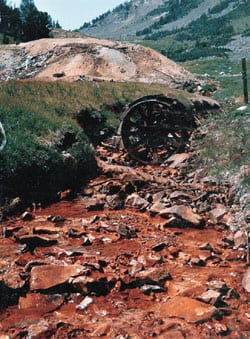A message in a bottle
by Buffalo Mazzetti, "Water More Precious Than Gold"
This article was originally published in May 2001

Protecting water quality, sustaining local economies and encouraging grass-roots action makes “Water More Precious than Gold” more than just another bottled drinking water. It’s part of an international movement to ban cyanide leach gold mining, with its roots in Washington State and the PCC membership.
Most consumers do not realize the connection between water quality and gold production. The ugly truth is that the modern gold mining process uses tremendous amounts of water and cyanide to leach microscopic flakes from vast tracts of land. Not only would a proposed gold mine in Washington’s Okanogan Highlands pollute 2,000 gallons of clean, mountain water for each ounce of gold it would produce, but it’s likely that acid mine drainage would create a toxic lake and pollute local streams with heavy metals and arsenic.
When a Texas-based mining company, Battle Mountain Gold (BMG), targeted Washington’s Okanogan Highlands for the first huge open-pit, cyanide leach gold mine in the state, it struck a vein of resistance. As elsewhere, BMG would use the archaic 1872 Mining Law and purchase rights to public land for less than $5 an acre. BMG would blast the top off Buckhorn Mountain (5,450 ft), dig 350 feet into the aquifer, and put cyanide-laced tailings over a creek!
Knowing that a mine couldn’t happen without massive pollution of the aquifer, “pure water is more precious than gold” became our battle cry to stop the mine. The Okanogan Highlands Alliance (OHA) was born. Five years later we realized that a local bottling company would create a liability for BMG. We began producing the bottled water, ‘Water More Precious Than Gold,’ which PCC has sold since 1998.
Creating jobs and a local sustainable economy using water resources makes more sense than extracting gold from our mountains. The retail value of pure drinking water can be as much as $13,400 for 2,000 gallons. Polluting that much water and selling the gold would net less than $275 for an ounce of gold. “Water More Precious Than Gold” is working to prove we can have a profitable and sustainable locally based business, while we protect our environment and serve the needs of our community.
After years of lawsuits, appeals, and delays by OHA, the Colville Confederated Tribes and other conservation groups, the mining company is appealing a ruling by the Washington State Pollution Control Board that stopped the mine. The board ruled the mine is illegal because it would permanently harm the water rights of farmers, ranchers and local residents beyond legal limits.
Use our bottles to send a message about watershed protection, drinking water standards and mining policies. Roll up and tape your message, slide it inside a dry bottle, affix a mailing label with 55 cents postage and send it to federal lawmakers. The Bush administration eagerly awaits your comments!
Let them know how you feel about the administration’s plans to roll back years of public process for stronger mining regulations and drinking water standards. The recently adopted standards for arsenic in drinking water, finalized in January, were the product of more than 25 years of research and debate. The U.S. Environmental Protection Agency (EPA) under Bush would withdraw them. The new standard was endorsed by the National Academy of Sciences and is identical to those used by the European Union and the World Health Organization.
The EPA documents that mining is responsible for 97 percent of all arsenic (a known carcinogen) released into the environment. This is in part because the old mining rules contain NO environmental performance standards; after a mine declares bankruptcy, taxpayers are left to pay the cleanup bill. The new mining rules direct mine operators to protect surface and ground water.
So send a message in a bottle, boycott new gold, and recycle used gold! There’s a 45-day comment period on the proposed rollbacks, ending May 7. Write:
- Senator Maria Cantwell, 717 Senate Hart Building, Washington D.C. 20510
- EPA Administrator Christie Whitman Ariel Rios Building, 1200 Pennsylvania Ave. NW, Washington D.C. 20460
- Senator Patty Murray, 173 Russell SOB, Washington D.C. 20510
- Director (630) BLM, Administrative Record Room 401LS, 1849 C St. NW, Washington D.C. 20240
- Email comments with subject header “Attn: AD 22” to: wocomment@blm.gov.
For more information, see www.mineralpolicy.org,
www.stoptherollbacks.org and www.purewater.org
